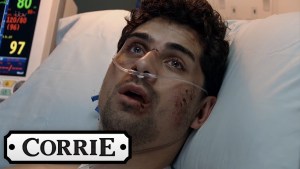It is 2018, and though we still have myths to bust and stigmas to break, attitudes towards disabled people are slowly improving.
Yet there are some who still believe that disability is a form of personal punishment for the disabled individual, a kind of karma for their past mistakes. My disability is visible, and, like many others, I have often encountered strangers in the street who were very eager to tell me that Jesus loves me or that God is washing my ‘sins’ and I will be compensated. Some have even suggested that my predicament is a result of my parents’ wrong doings. Despite knowing nothing about me, they are instantly certain that my experiences as a disabled person are continuously negative, and that is ‘served’ as a punishment.
To hear this view or to meet people who express such an opinion is irritating, but to see it performed on TV is a very uncomfortable viewing. Being a huge fan of ITV’s long running soap, Coronation Street, I have always been impressed by its hard-hitting storylines and complex representation of disabled characters. But few weeks ago, I was taken aback by the incorporation of disability as a means of punishment or unofficial justice.
The storyline began when the character of David Platt (played by Jack Peter Shepherd) was raped by Josh Tucker (played by Ryan Clayton) and due to lack of evidence, Tucker escaped legal punishment which did anger the soap’s fans but portrayed a reality; that many rape crimes do go unpunished. The former soap producer Kate Oates had always argued that punishment might not be of a legal nature: “In soap, a lot of the justice comes from the community”. A few weeks ago this ‘justice’ came in the form of visual impairment, as the character of Josh Tucker got beaten up so badly that it left him partially blind.
As I watched this story unfold, I could not help but feel extremely uncomfortable. The first thing that crossed my mind was England’s former football manager, Glenn Hoddle, who over twenty years ago was sacked from his position for voicing his opinion on why some individuals live with disability. He suggested that people born with disabilities were being punished for the sins of a former life, and under public pressure he soon resigned.
So why after all these years of progress has there been no public outcry about this storyline? By wrapping up the storyline with physical assault and permanent damage to Tucker’s eyes, Coronation Street are reinforcing the decades-outdated message: disability is a punishment. Do the soap makers not realise the powerful impact it has across the country? How their storylines affect people and shape general opinions?
Stigma against disabled people is still a big issue in our society. If you witness an argument between a group of non-disabled people, you undoubtedly hear derogatory terms of disability being used as insult or abuse. More than 7,000 hate crimes against disabled people were recorded as criminal offences in the past year, and it’s likely that many incidents were not reported.
With ratings sometimes exceeding 6 million viewers, Coronation Street has the opportunity and a responsibility to use its storytelling to explore and expose harmful stereotypes, and replace them with rounded characters and surprising novel story arcs. In the past, controversy has followed Corrie’s twists and turns, yet there has been little public reaction to this storyline. Why? Is the medieval idea that disability equals punishment not just in the minds of a few strangers who accost me in the street, but a deeply ingrained unconscious bias that has resisted half a century of the disability equality movement?
I am often asked ‘What happened to you?’ when people see me and, despite not owing them my entire medical history, I try my best to explain what muscular dystrophy is. After this storyline, I wonder whether people will drop the what for why and ask ‘Why did this happen to you?’


